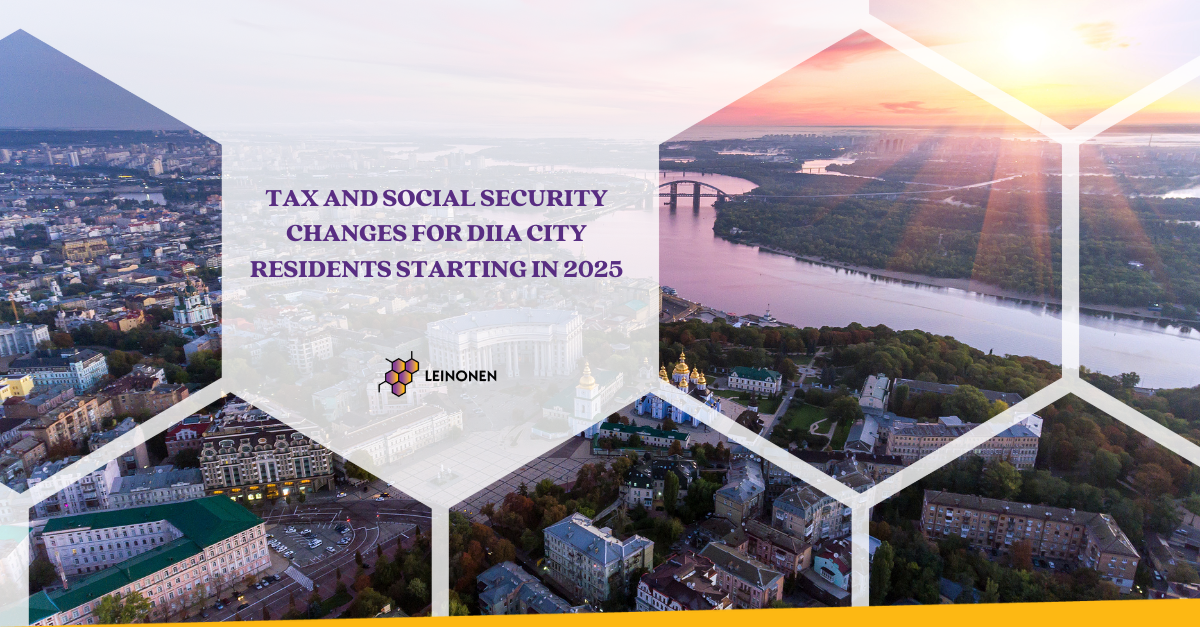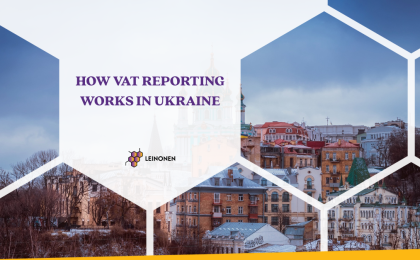The Ukrainian legislature has clarified taxation rules and social security contributions (ESV) for Diia City residents effective from January 1, 2025. These updates specify when preferential tax rates apply and how to address situations where residents fail to meet required criteria. Below is a comprehensive guide to these changes.
Introduction of Law No. 4113
On January 1, 2025, Law No. 4113 “On Amendments to the Tax Code of Ukraine and Other Laws to Stimulate the Development of the Digital Economy in Ukraine” comes into force. The law provides specific rules for applying a reduced personal income tax (PIT) rate of 5% and a minimum ESV contribution for Diia City residents, addressing both new residents and those who fail to meet residency requirements.
Preferential Taxation in the Month of Residency Acquisition
Personal Income Tax (PIT)
Diia City residents benefit from a 5% PIT rate for:
- Salaries,
- Remuneration under gig contracts, including compensation for creating and transferring rights to commissioned works, and
- Author’s remuneration for creating and transferring rights to official works.
However, residents lose the right to this reduced rate and must apply the standard 18% PIT rate if they fail to meet the following requirements:
- The average monthly remuneration for employees and gig specialists is at least €1200.
- The average number of employees and gig specialists is no fewer than nine.
These criteria are evaluated monthly, starting from the calendar month after obtaining Diia City residency. Previously, the 5% PIT rate applied from the subsequent month without legislative backing, which has now been resolved. From January 1, 2025, the PIT for earnings in the month of acquiring Diia City residency is taxed at 18%, with the 5% rate applying from the next calendar month.
Social Security Contributions (ESV)
Similar to PIT, the rules for ESV contributions have been clarified. The minimum ESV is applied if:
- The average monthly remuneration is at least €1200.
- The average number of employees and gig specialists is at least nine.
- There is no tax debt exceeding 10 minimum wages for more than 30 days.
From January 1, 2025, the minimum ESV contribution applies starting the month after acquiring residency. In the month of obtaining residency, the standard ESV rates apply.
PIT Adjustments for Non-Compliance
If a Diia City resident fails to meet the requirements for remuneration and the number of specialists in a given month, they must independently apply the 18% PIT rate. The calculation base includes all specialist incomes for that month. The additional PIT amount (18% – 5%) must be paid before submitting the tax declaration. This adjustment does not count as taxable income for the specialists.
Previously, discrepancies led to disputes with tax authorities, but the new law explicitly resolves this issue. Residents can deduct already paid 5% PIT from the 18% tax owed, avoiding overpayment.
Special Rules for Startups
Startups can gain Diia City residency even if they don’t meet the requirements for average remuneration or the number of specialists. This status is valid until December 31 of the year following the year they gained residency. During this period, startups are allowed to:
- Apply the 5% PIT rate if the average remuneration criterion is met, regardless of the number of employees.
- Pay ESV contributions at the minimum rate, provided other conditions are met.
After the grace period, if startups still fail to meet the requirements, they must independently pay the standard ESV and PIT rates. The additional amounts owed are calculated and paid for the preceding three months within the next calendar year.
Key Takeaways
- Clarifications for Residents: Starting January 1, 2025, Diia City residents benefit from clear rules on applying preferential PIT and ESV rates.
- Adjustments for Non-Compliance: PIT for months of non-compliance is adjusted, with deductions allowed for previously paid taxes.
- Support for Startups: Startups have reduced obligations for a limited time, encouraging their growth within the Diia City ecosystem.
These changes aim to streamline taxation and social security processes, fostering the development of Ukraine’s digital economy under the Diia City framework.





